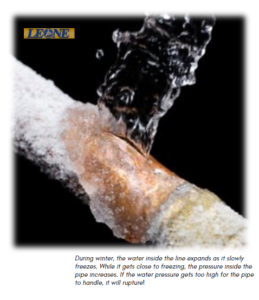
Pipes freezing during the winter season can bring trouble to your plumbing system. How long can your pipes stand the freezing temperature and when should you be worried about pipes freezing? Let’s talk about the issue that freezing pipes can bring and the precautions that everyone can take.
Why Do Water Pipes Freeze And Burst During The Winter?
One plumbing issue to watch out for during the winter season is the bursting of pipes. A pipe may burst if it is not able to handle the pressure that arises from freezing water.
During winter, the water inside the line expands as it slowly freezes. While it gets close to freezing, the pressure inside the pipe increases. If the water pressure gets too high for the pipe to handle, it will indeed rupture! The freezing water causes the lines to contract and the weak areas of the pipe may burst. It is recommended that you get your pipes checked and repaired before the winter season.
Should I Be Worried About Pipes Freezing?
If the outside temperature is at less than 20 degrees Fahrenheit, then you should be worried about pipes freezing! Water begins to freeze as the temperature drops which causes the pipes to freeze. Cold winds can also freeze the pipes. Pipes with cracks or holes allow the cold air from the outside to blow in and may cause ice formation. Once the pipe is freezing, it is at risk of bursting, resulting in leaks and unexpected flooding. But don’t let these scenarios worry you. There are precautions that you can take to prevent your pipes from bursting.
Precautions To Prevent Pipes From Freezing And Bursting
The contraction of pipes caused by the cold weather is something that we cannot control which may cause leaks. However, there is something you can do to
prevent pipes from freezing and bursting. Here are some of the precautions you can follow:
- Keep garage doors closed if there are water supply lines in the garage.
- Open kitchen and bathroom cabinet doors to allow warmer air to circulate around the plumbing.
- When the weather is very cold outside, let the cold water drip from the faucet served by exposed pipes. Running water through the pipe (even at a trickle) helps prevent pipes from freezing.
- Keep the thermostat set to the same temperature both during the day and at night. By temporarily suspending the use of lower nighttime temperatures, you may incur a higher heating bill, but you can prevent a much more costly repair job if pipes freeze and burst.
- If you will be going away during cold weather, leave the heat on in your home, and set it to a temperature no lower than 55° F.
Protect Your Pipes From Bursting This Winter
The winter season can be fun without being worried about your plumbing system. Preventive measures can alleviate the concern you have with pipes freezing. If you’re dealing with a burst pipe or water leak this winter, just
contact us and we are here to help you!  Pipes freezing during the winter season can bring trouble to your plumbing system. How long can your pipes stand the freezing temperature and when should you be worried about pipes freezing? Let’s talk about the issue that freezing pipes can bring and the precautions that everyone can take.
Pipes freezing during the winter season can bring trouble to your plumbing system. How long can your pipes stand the freezing temperature and when should you be worried about pipes freezing? Let’s talk about the issue that freezing pipes can bring and the precautions that everyone can take.